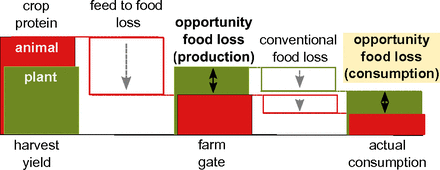Source: The opportunity cost of animal based diets exceeds all food losses | PNAS
Although the postproduction loss across the supply chain is similar for plant- and animal-based items, the production of a gram protein (or calorie) from animal sources requires about an order of magnitude more resources and emissions than producing a gram of protein from plant sources … Consequently, shifting to plant-based diets confers substantial environmental savings, comparable to or even surpassing projected improvements in agricultural productivity … In other words, due to the disparate resource requirements of plant- and animal-based food items, replacing animal-based items with more resource-efficient plant alternatives will increase food availability by permitting reallocation of production resources from feed to human food … Favoring resource-intensive food items like beef and pork over plant alternatives thus carries a substantial opportunity cost. Here we analyze the loss associated with such dietary choices as an effective food waste we term “opportunity food loss.” Because opportunity food losses reflect consumer choices, dietary preferences play a key role in determining their magnitude and mitigation. Unlike conventional food loss, opportunity food loss is hidden food that can be recovered via changes in diets.
…
… we compare the land use of each individual animal-based food item in the US food system with that of a nutritionally comparable plant-based alternative diet. Because plant alternatives need less land per unit protein or energy, replacing animal-based items with plant alternatives frees up agricultural land that can then be repurposed for growing additional food. Comparing this added food potential for the key animal categories—beef, pork, poultry, dairy, and eggs—quantifies the opportunity food losses their consumption represents and the food availability opportunities their replacement by plant-based alternatives offers.

